Development and Innovation
Product design is done in-house with support from best-in-field technological partners.
Our capabilities:
It is no secret that perhaps one of the keys to our success is blending our in-house expertise with the unparalleled skills of external collaborators. Our product design process is meticulously carried out in-house and enhanced by the support and insights from top experts in the field.
Our know-how extends across a diverse range of skills:
- We are proficient in product design, thanks to our advanced Catia and NX software, which allows us to create detailed and precise designs.
- Our team is highly skilled to conduct comprehensive thermal analyses, these ensure that our products can withstand various temperature conditions without compromising their integrity.
- Regarding mechanical analysis, we excel in both modal frequency analysis and random response analysis. These methods allow us to predict and mitigate any potential issues related to vibrations and structural responses, ensuring the longevity and reliability of our products.
- Additionally, the forming analysis enables us to validate that the product stays within the formability limits of the selected material.
- Through an electromagnetic analysis we are able to gauge the quality of the product throughout its lifespan.
- Lastly, our proficiency in computational fluid dynamics (CFD) allows us to analyze and optimize fluid flows within our products, enhancing their efficiency and performance.
This blend of in-house expertise and external collaboration positions us uniquely in the metal stamping industry. Our approach is not just about producing metal parts; it’s about engineering solutions that are robust, efficient, and tailored to meet the highest quality standards.
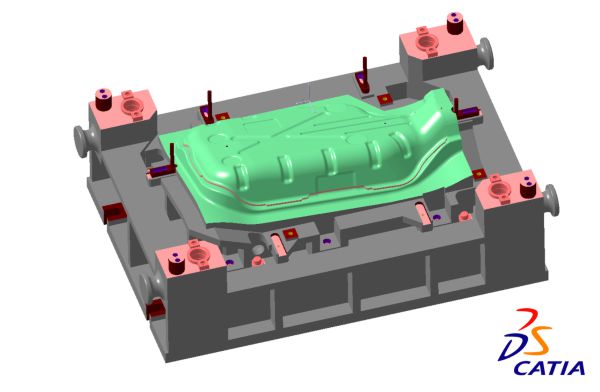
Product design using Catia NX
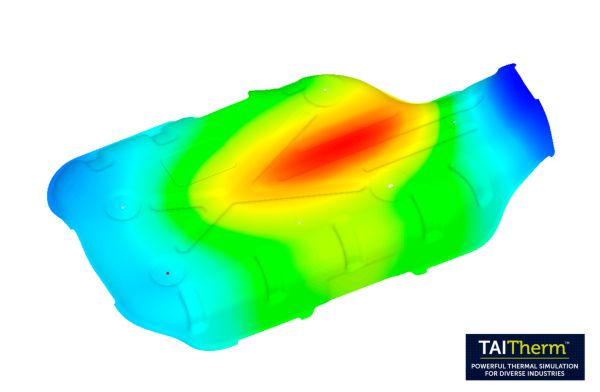
Thermal analysis
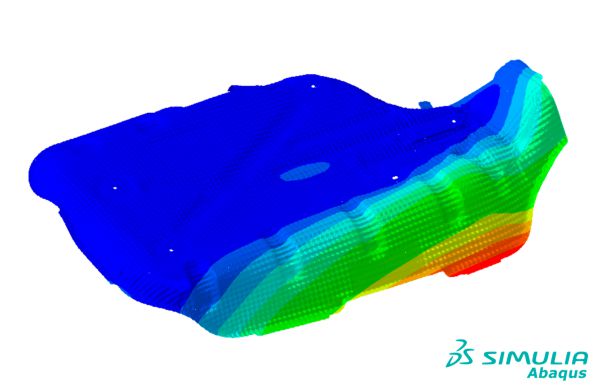
Mechanical analysis
Modal frequency analysis
Random response analysis
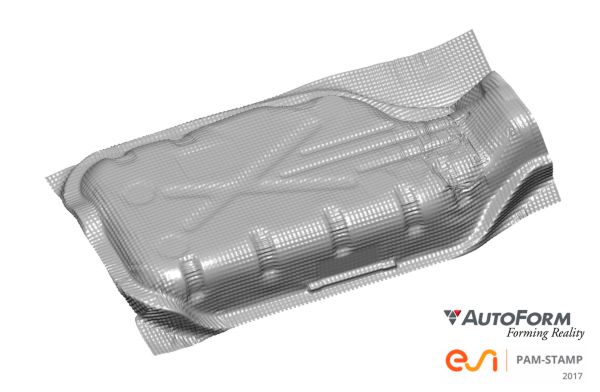
Forming analysis

Electromagnetic analysis

Computational fluids dynamic
Hands-on testing:
Since 1984 our approach to testing ensures that each product exceeds industry standards thanks to our four key tests: thermal, chemical, mechanical, and acoustic.
- Thermal testing is crucial for assessing how our products behave under various temperature conditions. To carry out this test, we simulate extreme heat and cold to guarantee the stability and durability of our products regardless of the environment conditions. This process is crucial to identify potential thermal degradation or deformation risks.
- Chemical testing is another key step in our quality control. We expose our parts to various chemicals to evaluate their resistance and durability. This process is especially important for products used in harsh chemical environments, ensuring they withstand corrosion, oxidation, and other chemical impacts.
- Mechanical testing is the backbone of our quality assurance. We subject our products to stress, strain, and impact tests to measure their strength and elasticity. This rigorous testing confirms that our products can withstand the physical demands of their intended applications.
- Finally, acoustic testing is conducted to ensure our products meet the noise level standards. This test is fundamental to ensure compliance with industry-specific acoustic requirements and contributing to a more comfortable and safe working environment.
At Neklar, we believe in hands-on testing and our solutions are adapted to new technologies to achieve clean mobility. Our commitment to quality at every stage of product development sets us apart in the metal stamping industry.
Fast prototyping
In the automotive industry, being able to provide fast prototypes is imperative to refine process design and enhance product performance. It is not just about speed; it involves a fusion of design precision, in-depth understanding of materials, and meticulous tailoring of the metal stamping manufacturing process to suit unique client needs.
Key elements such as lead time, cost-effectiveness, and tool durability are at the forefront when crafting prototype tools. This approach ensures that our solutions are not only efficient but also economically viable and durable: this expertise results in prototypes that are not mere conceptual models, but functional units that closely replicate the end product in terms of quality and performance within the metal stamping manufacturing process.
To sum up, fast prototyping in metal stamping is more than just a swift development approach; it is a comprehensive strategy of technical expertise, material science, and process design innovation. This synergy results in solutions that not only accelerate market entry but also uphold the highest standards of quality, consistently exceeding client expectations.
Innovation
Innovation in the automotive metal stamping sector has been accelerating at an unprecedented pace, transforming the industry with efficient technological advancements. Our dedicated innovation team, alongside our expert designers, are committed to change, development, transformation, progress, and are continuously transforming ideas into practical, cutting-edge solutions. This has positioned us at the forefront of automotive metal stamping innovation, particularly in areas like powertrain solutions, eMobility for electric vehicles (EVs), fuel cell electric vehicles (FCEVs), with bipolar plates.
Our current excitement revolves around three groundbreaking projects:
- The RIS3CAT IGNITE program, focused on the control and integration of intelligent machinery. The goal is to create an information-exchange architecture that is not only efficient and flexible but also standard and secure. This initiative considers the integration of various components within the industrial value chain, encompassing devices such as machines and sensors, monitoring and control systems like PLCs and SCADAs, and management systems including ERP, MES, PLM, among others, as well as operating systems.
- The FORMPLANET project aims to enhance the sheet metal forming industry as part of the HORIZON 2020 program.
- The LUBRINTEL initiative introduces advanced, intelligent lubrication systems for metal processing, backed by CIEN funding.
These three innovation projects encapsulate our vision for a future where automotive metal stamping innovation continually evolves to meet the dynamic needs of the industry, pushing the boundaries of what is possible in manufacturing efficiency and product quality.


FORMPLANET, on boosting the sheet metal forming industry under the HORIZON 2020 program.
Click here to learn more.
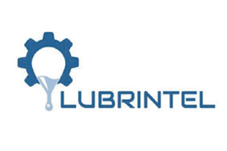
LUBRINTEL, new intelligent lubrication systems for metal processing under the funding of CIEN.
Click here to learn more.



